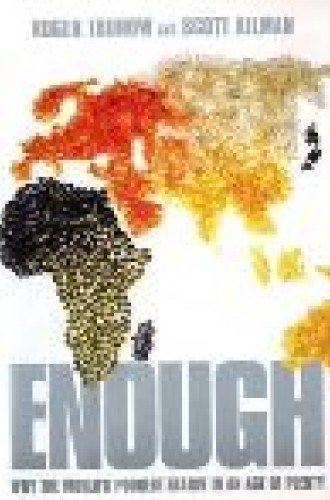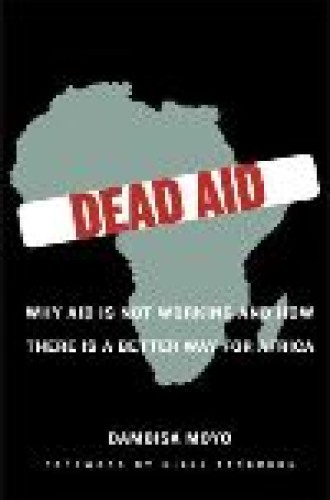Still hungry
While I was conducting a research project on property rights in southern Ethiopia in 1994, I watched truck after truck roll into the community to distribute food aid. I asked a local farmer if the harvest had been bad. He assured me of his abundant harvest of tomatoes and onions—cash crops that he normally couldn’t plant because he had to focus on feeding his family. However, he explained, with all the food aid they were now getting, he did not have to worry about feeding his family, so he could use his land to make some extra cash—and his family would eat wheat from America.
That same year, in addition to buying British military rations left over from the Gulf War, I could purchase at my local grocery store corn oil that came in big metal containers labeled “A gift from the people of America.” I resented having to pay for what was clearly intended to be food aid.
My experiences that year left me somewhat skeptical regarding foreign assistance, and it was a healthy skepticism. These two books tackle the reasons for that skepticism.
Zambian economist Dambisa Moyo has attracted a lot of publicity for her proposal, in Dead Aid, that foreign assistance to Africa should be cut off completely. Instead of taking foreign aid, she says, governments should seek money through the international financial markets, pursue ties with China, press for freer trade in agricultural commodities and develop microfinance institutions.
Aid is harmful to Africa, Moyo claims; it not only fails to alleviate poverty, it causes poverty: “Millions in Africa are poorer today because of aid; misery and poverty have not ended but have increased. Aid has been, and continues to be, an unmitigated political, economic and humanitarian disaster for most parts of the developing world.” Because regular people are not benefiting from aid, she says, they will not suffer from its cessation.
The contention that foreign aid does not alleviate poverty is not terribly controversial. Scholars and policy makers have been discussing the problem for well over a decade. But Moyo takes the argument a step further by suggesting that aid causes poverty. This assertion sets a high threshold for proof—which this book, targeted at a popular audience, does not provide.
Moyo’s argument pertains only to what she calls systemic aid: government aid and development banks’ direct transfers to governments. This narrowed definition of foreign aid allows her to discount assistance that goes from governments to nongovernmental organizations (NGOs).
Government aid to NGOs, one of the most effective areas of foreign assistance, funds programs such as the President’s Emergency Plan for AIDS Relief (PEPFAR). Moyo cavalierly dismisses PEPFAR, claiming that “two-thirds of the money had to go to pro-abstinence programmes.” Not only is this incorrect—in the 2008 fiscal year only about a quarter of funding went to prevention programs—but it fails to take into account that one of the most effective HIV prevention strategies is the ABC method (Abstain, Be faithful, use a Condom). The PEPFAR program provides antiretroviral medications to over a million people in Africa and has been exceedingly important in keeping individuals alive, families intact and economies functioning. PEPFAR’s effectiveness does not affect the validity of Moyo’s argument, however, because this is not systemic aid, the kind she wants stopped.
Once one accepts that Moyo is not going to prove that aid causes poverty and that she is talking only about a piece of the foreign assistance pie, the book becomes much more interesting. The writing is compelling, and she gives a very helpful overview of aid policies through the post–cold war era. She also skewers “aid culture.” For example, she ridicules what she refers to as “glamour aid” and asks why a musician like Bono has more influence on aid than African policy makers. Why, indeed?
Moyo also addresses the interests of the many people who are involved in the provision of humanitarian assistance and development aid, noting that “one of the most depressing aspects of the whole aid fiasco is that donors, policy makers, governments, academicians, economists and development specialists know, in their heart of hearts, that aid doesn’t work, hasn’t worked and won’t work.” Given her focus on systemic aid, this criticism appears to be leveled at the World Bank and some government programs. Yet the call to honesty is necessary across the board, in the private as well as the public sector. Aid is unlikely to become more effective unless we can accurately discern its impact.
Whereas Moyo’s book is theoretical and focused on making an argument, Roger Thurow and Scott Kilman tell the stories of people in Africa who are affected by aid policies in both positive and negative ways. They agree with Moyo that a large part of the problem with economic development is the trading system now in place, which penalizes African farmers and benefits farmers in the developed world.
In the United States, if a crop fails, the government writes the farmer a check, Thurow and Kilman note. But “in Africa, a crop fails and people die. African farmers . . . bear 100% of the risk in a very risky business.” The lack of crop insurance is not the cause of agricultural disaster in Africa, however. Thurow and Kilman identify an array of problems: poor infrastructure, decreased support from African governments for their farmers, agricultural subsidies in the developed world.
Their book begins with an account of the work of Norman Borlaug, the recently deceased architect of the green revolution, which made synthetic seeds and fertilizers available to farmers in Latin America and Asia and led to huge crop yields that virtually eliminated hunger in both areas. In the first part of their book, Thurow and Kilman explain why green-revolution technologies have not worked in Africa and tell stories of African farmers’ efforts to improve their yields and livelihoods.
Both books discuss the extremely negative effects that agricultural subsidies and unfair trade policies have on farmers in the developing world. Subsidies to farmers in the U.S. and Europe allow them to sell their crops on the world market below market prices, while African farmers receive no subsidies and cannot compete with the subsidized crops coming from the U.S. and Europe. When African farmers cannot feed themselves, they are sent humanitarian assistance in the form of grain and beans grown in the U.S. and sent to Africa via government-subsidized shipping. Local markets in African beans and grains are destroyed as free foreign food is sent in. Thurow and Kilman chastise U.S. and European governments for establishing agricultural policies that create hunger in Africa—and for then responding to hunger with humanitarian relief purchased in the West.
The system of subsidies and humanitarian assistance has created an iron triangle of vested interests in the U.S.—farmers, shippers and humanitarian aid groups that back the system of agricultural subsidies and food aid that are tied to U.S. agricultural interests. Reading through the grim explanation of why these harmful programs exist leads one to wonder why Thurow and Kilman didn’t add an exclamation point to the title of their book.
Yet Enough is by no means a tragedy. The second half recounts stories of what people are trying to do to change the nature of foreign assistance and humanitarian relief. It tells the story of a movement of people throughout the U.S. who want something different and better. They begin with the stories of Bill Gates and Bono (Thurow and Kilman have a very different perspective of their activities than does Moyo) and go on to describe how philanthropists, policy makers and citizens are pushing for better policies and beginning to develop their own strategies for combating hunger (full disclosure: I was one of the people interviewed for the book in this regard).
Enough will make some people unhappy. Thurow and Kilman embrace green-revolution technologies, which use large quantities of fertilizers—a position that will not find favor with people in the organic farming movement. Their criticisms will sting humanitarian groups and farmers who benefit from the programs currently in place. Yet even for those who disagree, the stories of individuals and groups engaging one another across continents with the goal of ending hunger will still be of interest.
In an unexpected similarity, both books end with a call for citizens to demand better foreign-aid policies for Africa. Although they come from very different perspectives, the authors agree that U.S. foreign assistance is deeply flawed and that we have a moral obligation to improve it.
The opportunities for citizen involvement are abundant this year as both the House and the Senate have put forward bills designed to reform foreign assistance. Bread for the World made such reform the topic for their 2009 Offering of Letters and has provided resources for individuals and congregations to address the issue. We are at a time when the outrage invoked by these books can lead to better policies and programs.






